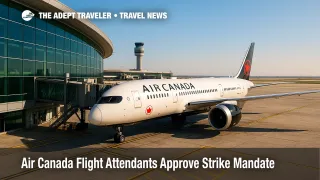Air Canada Flight Attendants Approve Strike Mandate

Negotiations between Air Canada and its cabin-crew union reached a critical point on August 5, when flight attendants voted 99.7 percent in favor of a strike mandate. The result empowers the Canadian Union of Public Employees to file a 72-hour strike notice once a federally required cooling-off period ends at 12:01 a.m. ET on August 16. More than 10,000 crew members across mainline Air Canada and Air Canada Rouge could legally stop work as early as August 19, potentially disrupting schedules at Toronto Pearson International Airport (YYZ), Montréal Trudeau International Airport (YUL), and Vancouver International Airport (YVR).
Key Points
- Why it matters: A near-unanimous vote signals deep frustration over wages and unpaid ground duties.
- Travel impact: A work stoppage could strand tens of thousands during summer travel peaks.
- What's next: The parties meet with a federal mediator before August 16, but the union can issue strike notice once cooling-off rules expire.
- Union seeks pay for all hours worked, higher per diems, and pension improvements.
- Air Canada insists a "fair and competitive" deal is still achievable without service cuts.
Snapshot
The five-day ballot closed at noon Eastern on August 5, with 94.6 percent turnout. The Canadian Union of Public Employees (CUPE) says 9,780 of 9,808 valid ballots supported authorizing a strike, eclipsing the simple-majority threshold set by the Canada Labour Code. Under federal rules, either side must give 72 hours' notice before job action. A mediator has been assigned since conciliation talks broke down on July 25. Air Canada carried 45.3 million passengers last year; roughly half flew through YYZ, YUL, or YVR.
Background
The current collective agreement dates to 2019, when flight attendants accepted concessions designed to stabilize finances during the pandemic. Those provisions freeze base pay for time on the ground, a practice the union now labels "systemic unpaid work." Median cabin-crew wages trail inflation by about 15 percent since 2020, according to internal CUPE calculations. Talks resumed in April 2025 but stalled after nineteen sessions. Conciliation produced no deal, triggering the statutory 21-day cooling-off period now ticking toward mid-August. The government has not signaled back-to-work legislation, preferring mediated settlement consistent with recent rail and port disputes.
Latest Developments
Wage Gap and Unpaid Ground Time
Union president Wesley Lesosky says members spend an average of 35 hours a month in uncompensated pre-flight duties. CUPE is demanding full pay from check-in to block time plus a 10 percent wage bump. Air Canada counters that total compensation already includes duty-day per diems and profit-sharing, adding that any increase must "support long-term competitiveness." Analysts at Raymond James estimate each 1 percent wage rise would add about CAD 16 million in annual costs.
Timeline to Possible Service Cuts
If no deal is reached by August 16, CUPE may deliver notice immediately, clearing the way for a strike after August 19. Air Canada must then decide whether to cancel flights proactively or operate a reduced schedule using management volunteers and wet-leased aircraft. The carrier has pledged to "keep customers informed" through rebooking and refund options. Consumer groups urge travelers with non-refundable August and September tickets to monitor their itineraries and consider flexible hotel and tour arrangements.
Analysis
The emphatic mandate amplifies labor-relations headwinds across North American carriers. United Airlines and American Airlines still face unresolved cabin-crew negotiations, while low-cost carriers battled pilot pickets earlier this year. Air Canada's vulnerability is acute because it relies on a hub-and-spoke model concentrated at YYZ, YUL, and YVR. A full walkout could ground up to 1,600 daily flights, ripple into regional feeders, and pressure trans-Atlantic and Asia-Pacific alliances. Investors may recall the 2011 ground-handling strike that forced government intervention; Ottawa's current minority Parliament, however, is less inclined toward emergency legislation. The union's focus on unpaid ground time resonates with U.S. counterparts lobbying regulators to mandate duty-day pay, suggesting a continent-wide pivot in cabin-crew expectations. Still, the legal requirement for 72-hour notice and public sentiment toward summer disruptions give both sides a strong incentive to settle. A deal that ties pay enhancements to productivity or profit-sharing could emerge, preserving the carrier's cost profile while addressing staff morale.
Final Thoughts
With an overwhelming 99.7 percent strike mandate in hand, Air Canada flight attendants have positioned themselves for decisive action if talks fail. Travelers booked after August 19 should track negotiations closely, build extra connection time, and review refund policies. The next 10 days are critical; compromise during federally mediated sessions will determine whether Canada's largest airline avoids a costly late-summer shutdown. For now, cautious optimism remains, but the countdown is under way on the Air Canada flight-attendant strike mandate.
Sources
- Air Canada flight attendants approve strike mandate, Reuters
- Air Canada flight attendants vote overwhelmingly in favour, Global News
- Air Canada flight attendants approve strike mandate, CTV News
- Air Canada issues statement after 99.7 percent vote, Travelweek
- Flight attendants approve strike vote by 99.7 percent, Open Jaw
